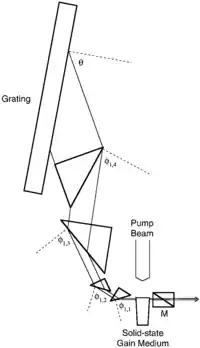نظرية التشتت عبر الموشورات المتعددة
كان إسحاق نيوتن أول من أعطى وصفًا لأشعة الموشورات المتعددة، والتشتت الناتج عن الموشورات المتعددة في كتابه البصريات.[1] وفي عام 1813، قدم ديفيد بروستر لكيفية توسع الأشعة عبر زوج من الموشورات.[2] وفي عام 1959، قدّم ماكس بورن وإيميل وولف تفسيرًا رياضيًا لتشتت الأشعة عبر موشور واحد.[3] وفي عام 1982، طرح دوارت وبيبر إلى نظرية عامة عن تشتت الأشعة عبر موشورات متعددة.[4][5]

أبرز التطبيقات التي استفادت من تلك النظرية، هي:
المراجع
- I. Newton, Opticks (Royal Society, London, 1704).
- D. Brewster, A Treatise on New Philosophical Instruments for Various Purposes in the Arts and Sciences with Experiments on Light and Colours (Murray and Blackwood, Edinburgh, 1813).
- M. Born and E. Wolf, Principles of Optics, 7th Ed. (Cambridge University, Cambridge, 1999).
- F. J. Duarte and J. A. Piper, "Dispersion theory of multiple-prism beam expanders for pulsed dye lasers", Opt. Commun. 43, 303–307 (1982).
- F. J. Duarte and J. A. Piper, "Generalized prism dispersion theory", Am. J. Phys. 51, 1132–1134 (1982).
- B. A. Nechay, U. Siegner, M. Achermann, H. Bielefeldt, and U. Keller, Femtosecond pump-probe near-field optical microscopy, Rev. Sci. Instrum. 70, 2758-2764 (1999).
- U. Siegner, M. Achermann, and U. Keller, Spatially resolved femtosecond spectroscopy beyond the diffraction limit, Meas. Sci. Technol. 12, 1847-1857 (2001).
- F. J. Duarte, Tunable Laser Optics (Elsevier Academic, New York, 2003) Chapter 7. [وصلة مكسورة] نسخة محفوظة 21 نوفمبر 2014 على موقع واي باك مشين.
- L. Y. Pang, J. G. Fujimoto, and E. S. Kintzer, Ultrashort-pulse generation from high-power diode arrays by using intracavity optical nonlinearities, Opt. Lett. 17, 1599-1601 (1992).
- K. Osvay, A. P. Kovács, G. Kurdi, Z. Heiner, M. Divall, J. Klebniczki, and I. E. Ferincz, Measurement of non-compensated angular dispersion and the subsequent temporal lengthening of femtosecond pulses in a CPA laser, Opt. Commun. 248, 201-209 (2005).
- J. C. Diels and W. Rudolph, Ultrashort Laser Pulse Phenomena, 2nd Ed. (Elsevier Academic, New York, 2006).
- بوابة علوم
This article is issued from Wikipedia. The text is licensed under Creative Commons - Attribution - Sharealike. Additional terms may apply for the media files.